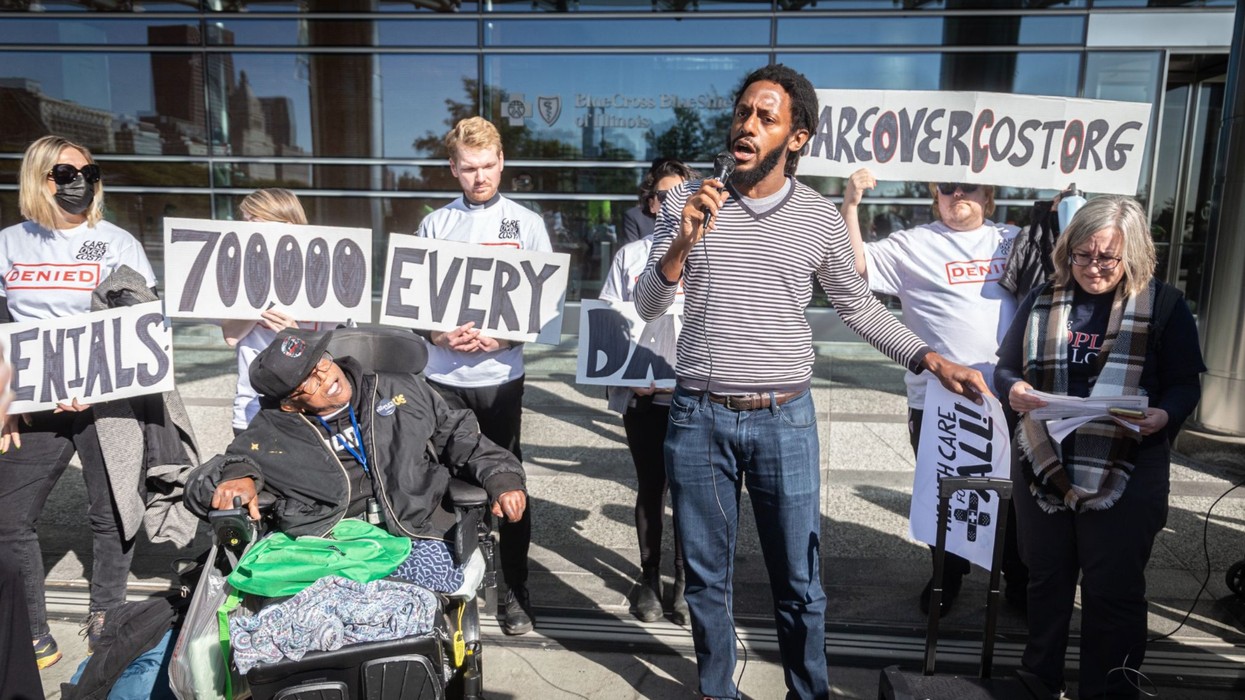UnitedHealth Reports $7.9 Billion in Q2 Profits After Protesters Arrested
"Health insurance coverage has expanded in America, but we are finding it is private health insurance corporations themselves that are often the largest barrier for people," said one organizer.
A day after 150 people assembled outside the headquarters of UnitedHealth Group to demand the for-profit health insurance giant stop its "systemic" denial of coverage, the company announced Tuesday the huge profits it raked in over the second quarter of 2024: $7.9 billion.
The sum, said one organizer, exemplifies why the demonstrators were willing to risk arrest to speak out against the firm's practices.
"UnitedHealth Group's $7.9 billion quarterly profit announcement is the result of a business model built on pocketing premiums and billions of dollars in public funds, then profiting by refusing to authorize or pay for care," said Aija Nemer-Aanerud, Health Care for All campaign director for People's Action Institute. "People should not have to turn to public petitions or direct actions to get UnitedHealthcare to pay for the care they need to live. That makes no sense, unless you're a shareholder or executive eyeing your next big luxury purchase."
Eleven people were detained by police at Monday's demonstration, where they blocked the street in front of UnitedHealth's headquarters in Minnetonka, Minnesota, displaying signs that read, "United (Denies) Healthcare" and "The Price Is Wrong."
The demonstration was organized by the Care Over Cost campaign at People's Action Institute, which has worked to help people across the country overturn care denials by UnitedHealth and other for-profit insurance giants.
Gina Morin of Auburn, Maine spoke at the event about having her mental health treatment denied by her Medicare Advantage plan administered by UnitedHealth.
"Two years ago my therapist was denied payment for seven of my mental health sessions she provided," she said. "I tried to pay her even though I'm on a limited income and she wouldn't take the money. If my provider, in her professional opinion, believed I needed those therapy sessions, who is UnitedHealth to deny coverage?"
As Common Dreams reported last month, UnitedHealth was named in a letter written by 52 members of the Democratic caucus in Congress as one of the healthcare companies that use artificial intelligence to decide via algorithm that coverage should be provided or denied to patients who have Medicare Advantage plans, which are billed as offering coverage that traditional Medicare doesn't include.
ProPublica reported last year on Christopher Naughton, a man with ulcerative colitis whose treatment cost $2 million per year, leading UnitedHealth to flag his account as "high dollar." The company contracted with a doctor to review Naughton's case, and the doctor found the treatment for symptoms including arthritis, debilitating diarrhea, and blood clots was "not medically necessary."
After suing the company, Naughton's family found UnitedHealth had lied about what Naughton's personal physician told the contractor in order to come to their conclusion and end coverage.
"Health insurance coverage has expanded in America, but we are finding it is private health insurance corporations themselves that are often the largest barrier for people to receive the care they and their doctor agree they need," Nemer-Aanerud told CBS News Monday.
In April, People's Action sent a letter to UnitedHealth noting that its CEO was paid nearly $10 million in 2022 while the CEO of its parent company "extracted over $90 million in executive and board pay for himself" over four years.
The company took $22.4 billion in profits in 2023 and sent $14.8 billion to shareholders through stock buybacks and dividends—yet continues to deny necessary healthcare coverage to its members.
The group called on UnitedHealth to:
- Stop denying claims and overturn any existing denials for treatments recommended by medical professionals;
- Immediately cease the practice of using artificial intelligence and algorithms to initiate claims denials in bulk; and
- Execute a publicly shared audit and reimburse federal and state governments for the public money diverted by claim and prior-authorization denials within Medicaid (Managed Care), and Medicare (Medicare Advantage), among other demands.

